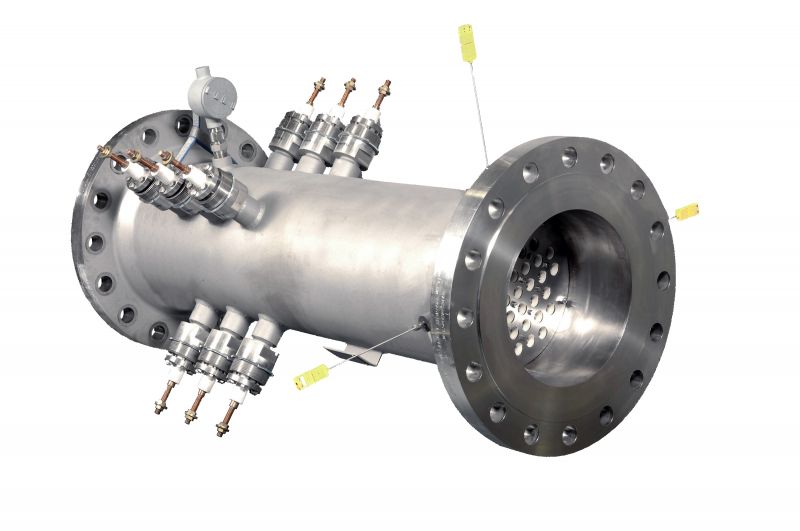
Hypersonic Research
Conditions at hypersonic speeds are extreme. Hypersonic components must be able to withstand the temperatures, pressures and airflows of hypersonic speeds if they are going to achieve these speeds and maintain structural integrity. Materials intended for use in hypersonic missiles and aircraft are rigorously tested at specialized facilities. The moisture in the air can form ice crystals. Ice crystals moving at MACH speeds can be very damaging to the wind tunnel test environment. Therefore, Custom Air Heaters are used to reduce humidity and heat the air to prevent ice crystals from forming and destroying very expensive wind tunnel chamber environments.
Additionally airflow around an object at MACH 5 has unique flow characteristics. High temperature air is also used to test material integrity at hypersonic speeds. The biggest challenge at hypersonic speed is protection from atmospheric drag, and severe temperature changes on the surface of the subjected part.


Hypersonic speed tests are conducted in different ways. One method involves a Wind Tunnel. Another uses an evacuated tunnel with tracks. On the tracks is a rocket strapped to a sled. SFI air heaters are used in hyopersonic wind tunnel tests. When you’re traveling that fast these lightweight materials are subject to a lot of friction so they need to be tested with heat and air.
Tutco SureHeat SFI heaters are situated within a high volume and high pressure airflow ahead of the test subject. The resulting high temperature airflow is directed at the forward end of the test subject mounted within the wind tunnel. The actual conditions of hypersonic speeds are difficult to achieve and so most of these tests use modeling with some combination of slower speeds and smaller test subjects in small enclosures. The data is then scaled up with math.
In one particular simulation, the air is heated to prevent freezing that can destroy a material. At hypersonic speeds nearing MACH 8.6 (6,599MPH), the oxygen in the air cools rapidly and ice quickly forms. The ice can bust up the material creating pin holes like sand blasting the materials. For this test, heat is used as a shield to avoid material degradation.
The SFI heaters that we make for hypersonic testing are 1 to 3 Megawatt heaters running close to 1,000C while under pressures up to 3,000 PSI. There are very few people capable of creating that kind of heat with that kind of pressure. This is our specialty. On top of that, no other heater of its kind can match our ramp up speeds.
While there is plenty of supersonic testing for both commercial and defense, hypersonic testing is largely done for defense related projects as well as university research.
- 1-3 Megawatt Heaters
- High Volume Airflow
- High Pressure 3,000 PSI
- High Temp near 1,000C
Specialty Heaters Quote Request
Temperature Range
Tutco SureHeat open coil electric air heaters can produce up to 1652°F (900°C) in standard designs and 1922°F (1050°C) in custom designs.
Pressure
Typical electric heaters can withstand up to 600psi (40 bar) standard and greater than 1100 psi (75 Bar) in custom designs.
International
Requirements:
Typical electric heaters can withstand up to 600psi (40 bar) standard and greater than 1100 psi (75 Bar) in custom designs.
Sizing & Selection
A simple formula for sizing the heater power (kilowatts) is given by: kW = SCFM x (Delta T)/3000, where SCFM is the mass flow rate in standard cubic feet per minute, and the Delta T is given in degrees Fahrenheit across the heater.
Calculate Wattage fa-calculator
Use our calculator and request a quote.



